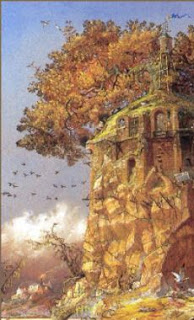When all
things come to an end – as some day they surely must – then shall the very last
man shut himself away in the Last Garden on Earth. There he shall hide and care
for the last tree and the last flowers, while all around him the world shall be
swallowed up. … And one day even the Last Garden shall be swept away and with it
the very last man, and the Earth shall have no husbandman, and shall run savage
like the Wilderness. And of Man there shall remain no trace, neither memory nor
regret.
Sometimes,
when it’s all in full leaf and hung with bees and butterflies, my garden feels
like the Hortus Conclusus, as though nothing exists outside it but ruin; as though
the waves of desolation are lapping at its walls (or chainlink fences overgrown
with bindweed and bramble). The water trickles in the pond and the marjoram
flowers provide multitudes of bees in umpteen varieties with plenty to keep
them going. The burning world is a long way away.
Of course it’s
not. As the earth warms some plants will retreat and others will advance, and insects
or birds we find familiar in southern England will be ousted in favour of others,
new fauna which will cause us different problems. In fifty years, when I am
long gone, my garden, if it still exists, will look different, and not because
this little bust and the other statuary will be absent. A younger generation
will accommodate itself to changes like this, and will mourn the past no more
than I am especially affected by the lack of elm trees in the English
countryside, which all vanished in my childhood thanks to ophiostoma ulmi. I
fear that will not be the worst they have to deal with.



No comments:
Post a Comment